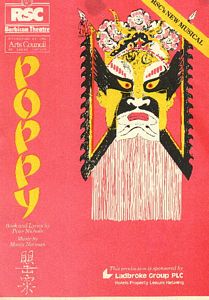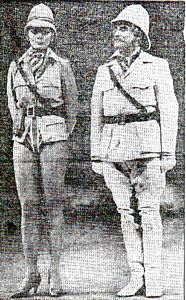POPPY by Peter Nichols
and Monty Norman
Venue: Barbican 1982
Company: RSC
Director: Terry Hands
Venue: Barbican 1982
Company: RSC
Director: Terry Hands

| Tao-Kuan Emperor of China | Tony Church |
| Queen Victoria | Jane Carr |
| Jack Idle a man servant | Stephen Moore |
| Randy his horse | Christopher Hurst Andrew Thomas James |
| Sally Forth a schoolmistress | Julia Hills |
| Cherry her mare | Noelyn George Sarah Finch |
| Lady Dodo the dowager Lady Whittington | Geoffrey Hutchings |
| Dick Whittington the squire | Geraldine Gardner |
| Obadiah Upward a London merchant | Bernard Lloyd |
| Lin Tse-Tsii Commissioner to Canton | Roger Allam |
| Teng T'ing Chen Viceroy of Kwuantung | Brian Poyser |
| Yo-Yo his daughter | Susan Leong |
| Clerks | Jim Cassidy Stewart Mackintosh Gary Sharkey Steve Simmonds |
| Indian Dancer | Seeta Indrani |
| Tiger | Michael Gyngell |
| Elephant | Ken Robertson David Whitaker |
| Albert | Ken Robertson |
| Chinese Girl | Seeta Indrani |
| Chinese Dancer | Noelyn George |
| Lord Palmerston | David Whitaker |
| Swings | Jan Revere Antony Sirnons |

Geraldine Gardner (Dick Whittington) and Bernard Lloyd (Obadiah)
Review
Observer: Victoria Radin
Chinks in the panto
There comes a glorious moment in Peter Nichols’s Poppy (Barbican), when Lady Dodo, a pantomime Dame, sings a naughty French chanson called Nostalgie de la boue to her déclassé lover while the pair are followed round the stage by a large white elephant.
At its best the show, a cross between a panto, a musical and agitprop, is audacious, unpredictable and wild. But for the most part Nichols's latest (and purported last) edition of his allegories on the state of the nation feels weary and lost within Terry Hands's lavish Broadway-or-bust production. This has been a sad week, when both the RSC and the National Theatre, with Alan Ayckbourn's long-delayed Way Upstream, appear to have gone bonkers in their concrete bunkers with the money and technology at their disposal.
In Poppy, Nichols sheds new light on yet another squalid episode of British Imperialism (are there any left to he dramatised?), known as the Opium Wars. To non-historians like me these events, which ran from 1839 to 1842, had something to do with keeping the world safe from dope: in fact their purpose was to defend Britain's right to foist the drug on millions of Chinese and, via laudanum and patent medicines, on most of the British population.
The play opens with a dialogue between Queen Victoria (Jane Carr) and the Emperor of China (Tony Church); pauses to gather up a traditional Dick Whittington (Geraldine Gardner), his Ma the Lady Dodo (Geoffrey Hutchings's superb cross-fertilisation of the panto dame with Lady Chatterley), a rustic Jack Idle (Stephen Moore), his horse Randy and his love Sally (Julia Hills); and then, making a detour for London and the greasy capitalist parvenu Obadiah Upward (Bernard Lloyd, soon to become the Dodo's bit of rough), sets sail for India and China.
At the same time Nichols sets forth on a fair amount of pedagogy: the second half of the show often looks like the worst of Old Half Moon hectoring, intolerably dressed up. Queen Victoria begins to make perplexing appearances as a missionary and a Salvation Army lady (a stomping evangelical number, composed by Monty Norman in flattish form, demonstrates how far we are from 'Guys and Dolls') and we are told that 'the three C's - Christianity, commerce and civilisation' - are a thoroughly reprehensible trinity.
Nichols doesn't make the mistake of turning the Chinese into the goodies, but I could have done with one involving and fleshly hero (there is Randy, the panto horse, but he is killed in a moment of Bondian cruelty) on which to focus my affections
The play is written as pantomime: Nicholas’ programme note suggests that he was trying to use this form of popular theatre, which reached its heyday during Victoria's reign, to make a statement about that era. But where is a character on the scale of Aladdin or Cinderella? Where indeed is the story? And why not funny representational backcloths instead of Farrah's exquisitely tasteful flying emblems? And why shroud the live orchestra behind a screen? And do we need the miking?